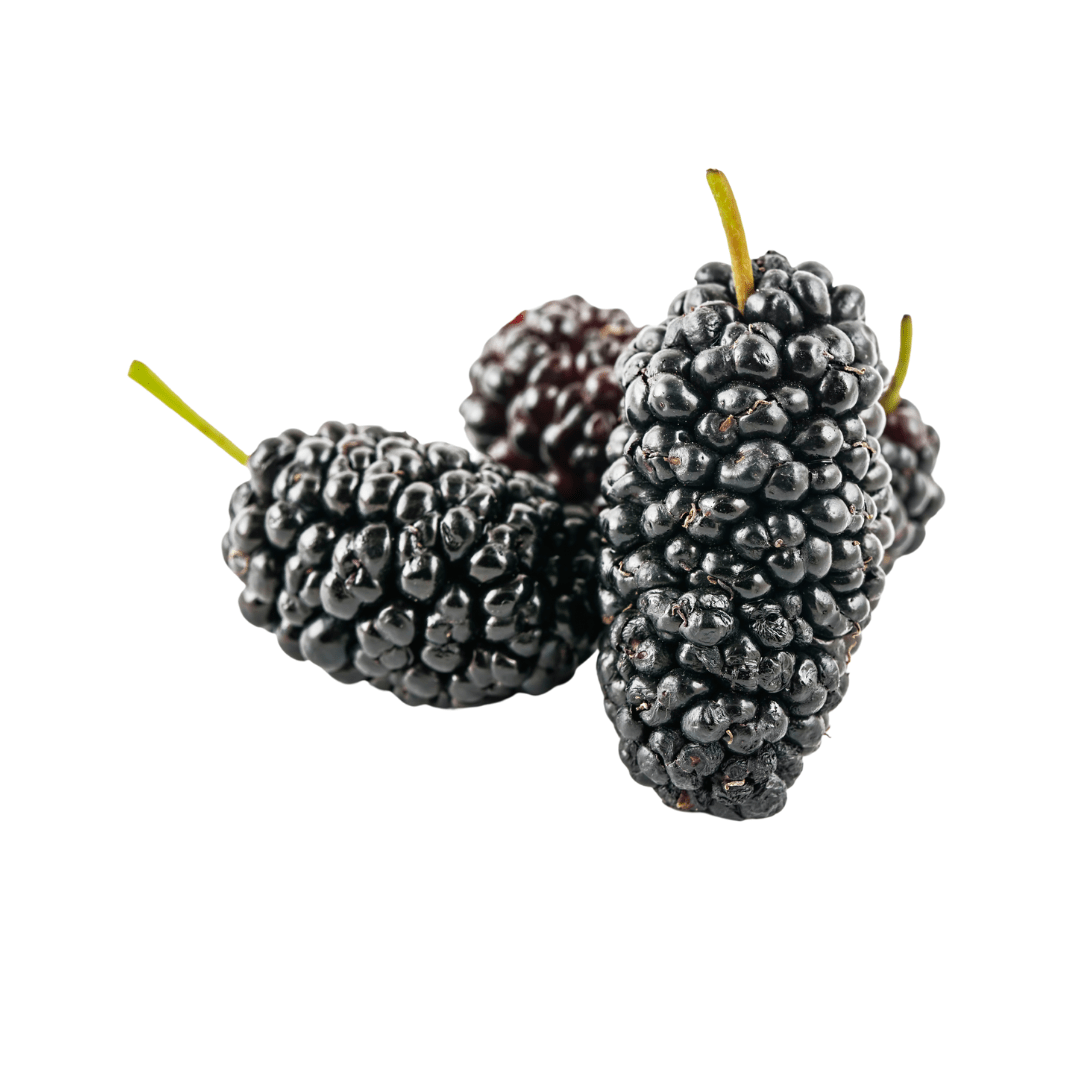About
Mulberry is a sweet, juicy fruit that grows on trees of the Morus genus. It is commonly found in many parts of the world and is a popular ingredient in various cuisines. The fruit is usually black or white and can be eaten fresh or dried.
Health Benefits:
-
Blood sugar control: Mulberries are low in sugar and high in fiber, which can help regulate blood sugar levels and prevent diabetes.
-
Heart health: Mulberries contain antioxidants and flavonoids that may help lower blood pressure, reduce cholesterol levels, and prevent heart disease.
-
Digestive health: The high fiber content in mulberries can promote digestive health by aiding in bowel movements and preventing constipation.
-
Immune system booster: Mulberries are a good source of vitamin C, which can help boost the immune system and protect the body against infections.
-
Anti-cancer properties: Some studies have suggested that mulberries may have anti-cancer properties due to their high levels of antioxidants.
Diseases that can be cured:
There is no conclusive evidence that mulberries can cure any particular disease. However, their antioxidant and anti-inflammatory properties may help improve symptoms of certain conditions.
Energy and Macronutrient content of 50 grams of Mulberry
| Nutrient | Amount |
|---|---|
| Calories | 23 |
| Carbohydrates | 6 g |
| Protein | 0.4 g |
| Fat | 0.2 g |
| Fiber | 1.4 g |
| Water | 42.4 g |
The vitamin content of 50 grams of Mulberry
| Vitamin | Amount |
|---|---|
| Vitamin A | 85 mcg |
| Vitamin B1 | 0.01 mg |
| Vitamin B2 | 0.03 mg |
| Vitamin B3 | 0.3 mg |
| Vitamin B6 | 0.05 mg |
| Vitamin B12 | 0 mcg |
| Vitamin C | 36 mg |
| Vitamin D | 0 mcg |
| Vitamin E | 0.1 mg |
| Vitamin K | 10.2 mcg |
| Folate | 6 mcg |
| Biotin | 0.1 mcg |
The mineral content of 50 grams of Mulberry
| Mineral | Amount |
|---|---|
| Calcium | 18 mg |
| Iron | 0.4 mg |
| Iodine | 0 mcg |
| Zinc | 0.2 mg |
| Magnesium | 9 mg |
| Phosphorus | 11 mg |
| Potassium | 103 mg |
| Sodium | 2 mg |
| Chloride | 8 mg |
| Copper | 0.05 mg |
| Chromium | 0 mcg |
| Fluoride | 0 mcg |
| Molybdenum | 0 mcg |
| Manganese | 0.1 mg |
| Selenium | 0.2 mcg |
What is Mulberry and where does it come from?
Mulberry is a sweet and juicy fruit that grows on trees of the Morus genus. It is commonly found in various parts of the world.
Are Mulberries available in different colors?
Yes, Mulberries can be black or white, depending on the variety.
How can Mulberries benefit blood sugar control?
Mulberries are low in sugar and high in fiber, which can help regulate blood sugar levels and prevent diabetes.
What makes Mulberries beneficial for heart health?
Mulberries contain antioxidants and flavonoids that may help lower blood pressure, reduce cholesterol levels, and prevent heart disease.
How do Mulberries promote digestive health?
The high fiber content in Mulberries can promote digestive health by aiding in bowel movements and preventing constipation.
How does Mulberry boost the immune system?
Mulberries are a good source of vitamin C, which can help boost the immune system and protect the body against infections.
Can Mulberries help in preventing cancer?
Some studies suggest that Mulberries may have anti-cancer properties due to their high levels of antioxidants.
Are there any specific diseases that Mulberries can cure?
There is no conclusive evidence that Mulberries can cure specific diseases, but their antioxidant and anti-inflammatory properties may improve certain conditions.
How many calories are there in 50 grams of Mulberry?
50 grams of Mulberry contains approximately 23 calories.
What vitamins are present in Mulberries?
Mulberries contain vitamins such as vitamin A, vitamin B1, vitamin B2, vitamin B3, vitamin B6, vitamin C, vitamin D, vitamin E, and vitamin K.
What minerals are found in Mulberries?
Mulberries contain minerals such as calcium, iron, zinc, magnesium, phosphorus, potassium, sodium, copper, and manganese.
Are Mulberries good for skin health?
Mulberries' antioxidant content may be beneficial for skin health, protecting it from damage caused by free radicals.
Can Mulberries be dried for consumption?
Yes, Mulberries can be dried to preserve them for later consumption.
How can one grow Mulberry trees?
Mulberry trees can be grown from seeds or cuttings and prefer warm climates.
Are there any side effects of consuming Mulberries?
In general, Mulberries are safe to consume, but some people may be allergic to them.
Can Mulberries be included in a weight loss diet?
Yes, Mulberries are low in calories and high in fiber, making them a suitable option for weight loss diets.
How do Mulberries taste?
Mulberries have a sweet and tangy taste, which makes them delicious to eat fresh or dried.
What is the best way to store Mulberries?
Mulberries should be stored in the refrigerator to keep them fresh for a longer time.
Are Mulberries available all year round?
Mulberries are usually available during their specific season, but dried Mulberries can be found year-round.









